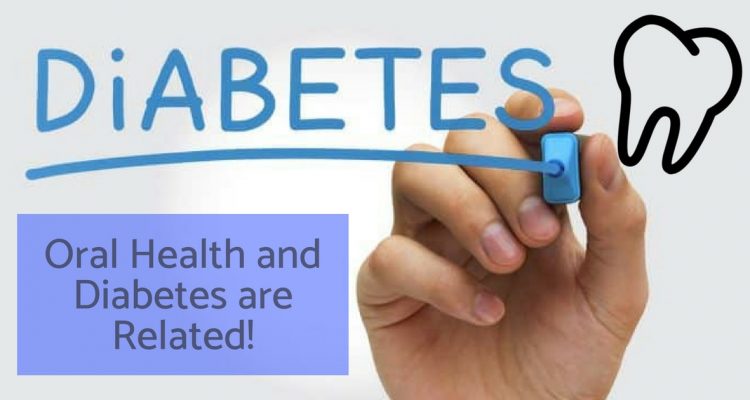Diabetes and Oral Health: Myths and Realty
Diabetes patients are aware that the condition can impair the eyes, nerves, kidneys, heart, and other vital organs. Did we ever realize that diabetes can also affect our oral health ?
A healthy mouth is crucial for everyone, but high blood sugar might make it more difficult. If you have diabetes, taking care of your teeth is even more important. Oral health concerns are more likely to develop if blood sugar is not effectively managed. This is due to the fact that uncontrolled diabetes reduces white blood cells, which are our body’s principal defence and leads to several bacterial infections in the mouth.
Diabetes is more than just sweet craving:
If your blood sugar level is high, so is your saliva sugar level. Bacteria in plaque, a sticky film, feed on sugar. Some of these microorganisms are responsible for tooth decay, cavities, and gum disease. If the tooth is not treated, it may eventually fall out.
If you have diabetes, your gum disease may be more severe and take longer to recover. Diabetes may be more difficult to manage if you have gum disease.
What oral health problems are due to uncontrolled diabetes?
- Diabetes can cause a decrease in saliva (spit) flow, leading in dry mouth. Soreness, ulcers, infections, and tooth damage can all result from dry mouth.
- In addition to diminishing white blood cells, diabetes also causes blood vessels to become thicker. This reduces the transport of nutrients to and waste products from oral tissues. Due to this occurrence, the body loses its ability to fend off infections. Since periodontal disease is a bacterial infection, uncontrolled diabetes may increase the frequency and severity of gum disease. If you observe any indications or symptoms of gum disease, including the following, please make an appointment with your dentist as soon as possible.
- Red, swollen and bleeding gums.
- Pus coming out from gums.
- If you have loose teeth as gums are not healthy.
- Halitosis or bad breath.
- Spaced teeth.
- Infections in your mouth can take longer to heal and you may feel burning sensation.
• Thrush: Diabetes patients who routinely take antibiotics to treat various diseases are more likely to develop a fungal infection of the mouth and tongue. The fungus thrives on the high glucose levels in uncontrolled diabetes patients’ saliva. The painful, sometimes ulcerated, white or red patches on the surface of the mouth that are caused by a fungus called as candida albicans. Oral thrush can be treated by maintaining proper oral hygiene and maintaining blood glucose levels within the normal range. If necessary, the treatment for this illness will consist of antifungal medicine that will be prescribed by your dentist.
How can I take care of my oral health if I have diabetes?
Since people with diabetes are more susceptible to conditions that could harm their oral health, it is essential that they practice good oral hygiene and give special attention to any changes. Also regularly visit to their dental professionals for consulting. Following are some important points which you have to remember if you are diabetic and at the same time concerned about your oral health:
- Try to maintain a healthy blood sugar level. Make sure to update your dentist about your diabetes management at each checkup. The glycosylated haemoglobin (HgA1C) level is one such indicator. (Good management is indicated by a level under 7%). Repeated episodes of low blood sugar, also known as an insulin response, are more likely to occur in people who have had them before. You should inform your dentist about the timing of your most recent episodes, the frequency with which they occur, and the time of your most recent insulin injection.
- Consult your primary care physician before making an appointment for treatment of periodontal disease. Make sure to ask your primary care physician to discuss the state of your oral health with your dentist or periodontist. If you are about to have oral surgery, your primary care physician or dentist will let you know whether or not you need to take any pre-surgical antibiotics, whether or not you need to change the schedule of your meals, and whether or not you need to adjust the time and dosage of your insulin (if you take insulin).
- Bring a list of all the drugs you are currently taking, including their names and dosages, to your dentist appointment. This information is necessary for your dentist to have in order to prescribe medications that are less likely to interact negatively with the medications you are already taking. If you are undergoing treatment for a significant infection, your insulin dosage (if you are currently using insulin) may need to be modified.
- Remember that patients with diabetes may experience a lengthier recovery time than average. Be sure to carefully adhere to the post-treatment instructions provided by your dentist.
- If your blood sugar isn’t effectively regulated, you should postpone any dental procedures that aren’t an emergency. On the other hand, immediate medical attention is required for acute infections, often known as swiftly progressing illnesses, such as abscesses.
- If a wire or bracket (such as the ones found in braces) cuts your tongue or mouth, you should contact your orthodontist as soon as possible.
Additional tips:
- At least twice a year, you should visit the dentist to have your teeth and gums checked and cleaned. Have a discussion with your dentist about the frequency of your required checkups.
- Use dental floss at least once a day to remove plaque buildup on the teeth.
- Brush your teeth with soft bristles toothbrush otherwise it may harm your gums.
- If you are a denture wearer, remember to remove it and clean it properly every day.
- Smoking is highly injurious, try to quit smoking as it leads to worsening of gum problems.
- If denture has any sharp or irregular surfaces, immediately visit your dentist to fix it.
- People who have diabetes experience tooth loss more frequently and at an earlier age than those who do not have diabetes.
Myths about diabetes and Oral health: There are some misconceptions that exists our minds when we talk about diabetes and our oral health scenario.
- People who have diabetes are more likely to have tooth loss due to a variety of circumstances. To begin, diabetics whose condition is not well managed have a greater risk of developing gingivitis and periodontal disease than those whose diabetes is well treated. If the infection is allowed to continue, it may spread to the bone that lies behind the teeth and secures them in place. People with diabetes take longer to recover from infections, which makes this situation more difficult to manage than it would otherwise be.
Individuals with diabetes can significantly reduce or eliminate the risk of periodontal disease and tooth loss by adhering to proper oral hygiene practises. These practices include brushing the teeth at least twice a day, preferably after each meal, using a fluoride toothpaste, daily flossing, and effectively managing blood sugar levels.
- People with diabetes have more chances of caries.
In regard to this subject, there are two schools of thinking. One school of thought maintains that uncontrolled diabetes is associated with excessive levels of glucose in the saliva, which in turn encourages the growth of bacteria. Caries, sometimes known as cavities, and gum disease can result from this. Caries is another name for cavities. In addition, persons who have diabetes have a tendency to have meals that are both smaller and more frequent throughout the day. Because of this, the likelihood that germs will proliferate and that cavities will form is increased.
The opposite school of thought maintains that diabetics are better knowledgeable about proper nutrition and the necessity of carefully regulating the amount of sugar they consume. They don’t consume a lot of meals that are high in sugar, which can lead to cavities.
People with diabetes who are able to keep it under control are not more likely to suffer from periodontal disease or tooth decay than people who do not have diabetes. The best defences against the development of cavities and periodontal disease include maintaining healthy blood sugar levels and practising thorough dental hygiene.
- If I need oral surgery, I have a greater chance of experiencing post-operative complications, such as infections, because diabetes makes it more likely for patients to experience these issues.
Problems after surgery are no more common in persons with diabetes than they are in those who do not have the condition if they receive close medical care and practise self-care that brings their blood sugar levels as close to normal as is possible, as well as good personal and professional dental care.

Written By : Dr. Divya Tandon , PhD
Medically reviewed by Dr. kalpanaa
